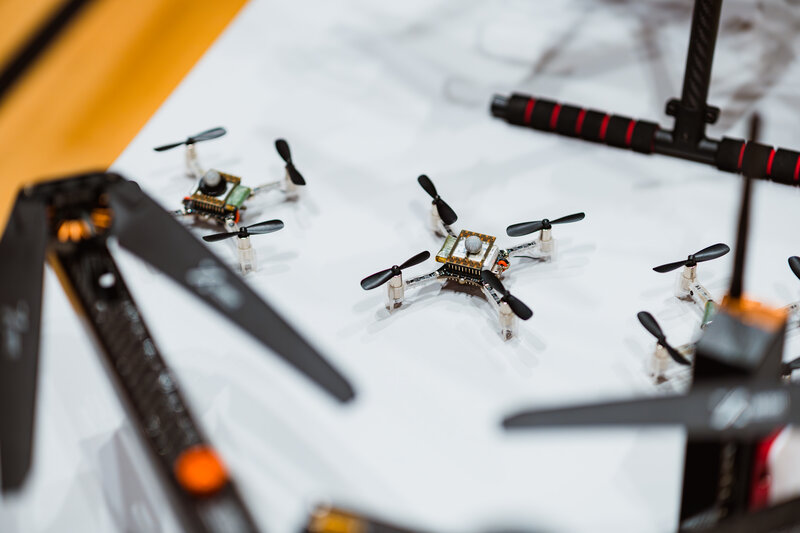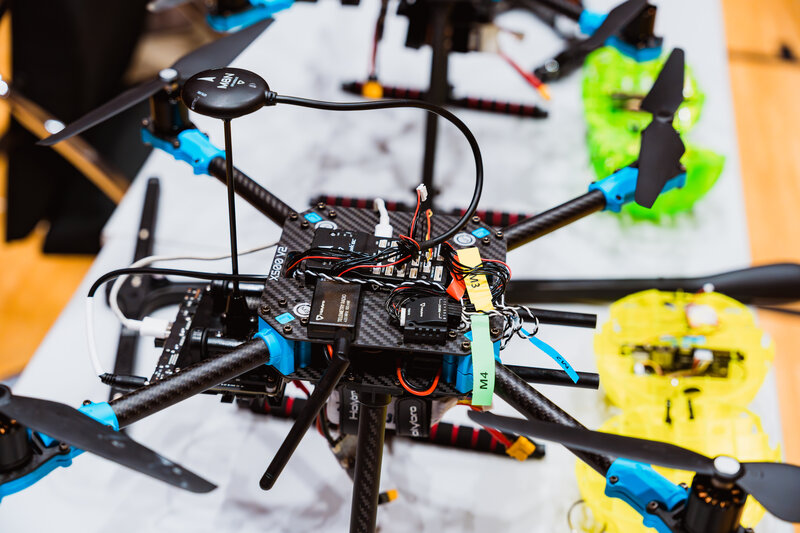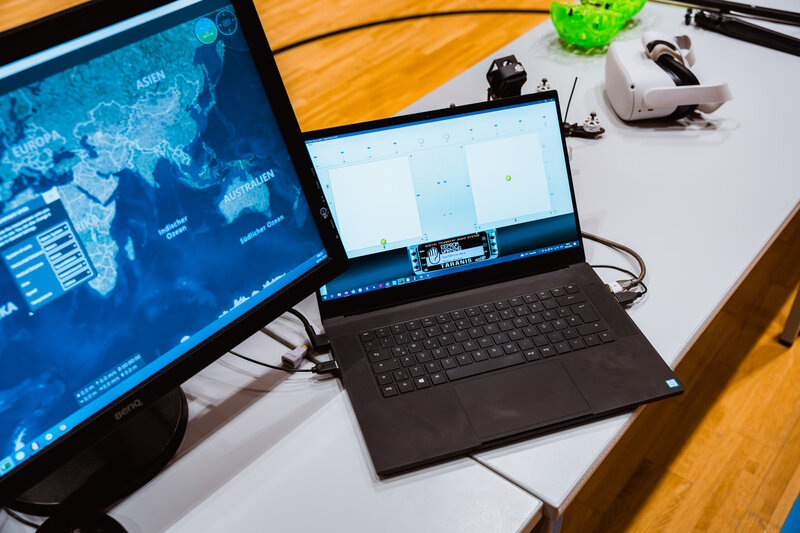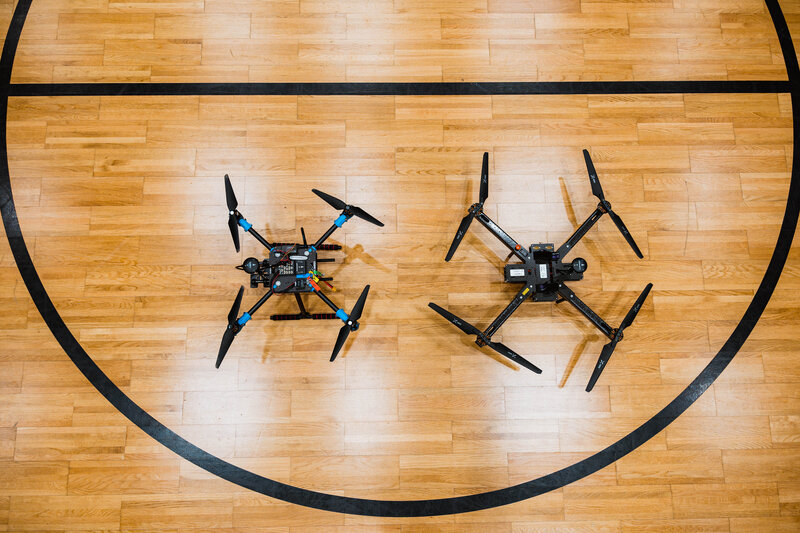Our full-time bachelor's degree program in Drone Engineering & AI-based Innovation provides comprehensive training in drone design, control, programming, and data analysis. Become a pioneer in the drone industry! All courses are taught 100% in English.

Drone Engineering & AI-based Innovation
Bachelor's degree program
Overview
-
Qualification Level:
Stufe 1, Bachelor -
Price:
Euro 363,36* (excl. Student Union-fees) each semester -
Academic Degree:
Bachelor of Science in Engineering (BSc) -
Academic Program:
Full-time -
Language:
100% English -
Remote Options:
E-Learning max. 30 % online -
Exchange Semester:
5. Semester -
Admission Requirements:
General admission requirements -
Study Places per Year:
25
Program Description



Discover the Drone Engineering & AI-based Innovation degree program: Learn the art of civil drone operation and management. Our graduates are technically proficient, understand ethical, legal and social aspects and are trained in critical thinking, problem solving and project management.
The Drone Engineering & AI-based Innovation degree program provides comprehensive knowledge of drone technology and its applications. It focuses on drone design, propulsion systems, and electronic subsystems grounded on the fundamentals of aeronautics and aerodynamics. Software and programming modules enable students to control drones and autonomous uncrewed aircraft systems (UAS). Sensor technology and data analysis allow for meaningful use of the collected data. Legal and safety issues complete the curriculum. English as the language of instruction, additional foreign languages, a semester abroad, and an internship, provide international experience. Management skills and entrepreneurial thinking enhance career opportunities in the global marketplace.
Study Focus
-
25 %
Drone programming and sensor evaluation
-
25 %
Flight Engineering and Aviation Fundamentals
-
25 %
Transfer of practical experience
-
25 %
Complementary content
What You Will Learn
-
Developing drone applications
-
Controlling swarms of drones
-
Fundamentals of drone design and components
-
Sensor data analysis
-
Legal regulations for the use of drones
-
Economic fundamentals for the development of a drone company
Popular Occupational Fields
- Aerial Intelligence Expert
- UAS Engineer
- Aviation/Drone Systems Engineer
- UAS Operation Specialist
- UAS Safety Specialist
- UAS Entrepreneur
Career Opportunities
-
EUR 50,200 average salary
for drone pilots (according to droneblog.com)
-
USD 11.8 billion
European market size through 2029
-
8,62 % Growth
in Europe in the forecast period up to 2029
-
USD 25.3 billion
global market size for drones
-
13,4 % global growth
in the forecast period up to 2033
The path to the Bachelor's Degree

The degree program consists of six semesters. In the first two semesters, students are introduced to the fundamentals of drone programming, control systems, and data evaluation. These topics are explored in greater depth during the 3rd and 4th semesters. The 5th semester is dedicated to a study abroad experience, allowing students to expand their knowledge in an international setting. In the 6th semester, students complete an internship and work on their bachelor’s thesis.
Special features:
-
Practical knowledge transfer from day one
-
Drone licensing and flight testing in the drone hangar and outdoor test field
-
Integrated semester abroad in 5th semester
-
Integrated internship in semester 6 for optimal career entry
Recognition of Prior Learning
Students have the option to receive credit for skills and competencies they have already acquired before the start of each semester.
To apply for credit, they must submit a request directly to the Director of Studies.
Director of Studies

Prof. (FH) DI Dr. Martin Adam
Director of Studies Bachelor Drone Engineering & AI-based Innovation, Industrial Engineering & Management, Master ERP-Systems & Business Process Management, Master Smart Products & Solutions, Smart Products & AI-driven Development
Curriculum
Introduction to Programming
- Semester 1
- 5 ECTS
- Fundamentals of Computer Programming: Introduction to the basic programming concepts, including what programming is, how it works, and its significance in creating software applications. - Basic Components of Programming: Variables and Data Types, Control Structures, Functions and Procedures, Data Structures - Object-Oriented Programming (OOP): Principles of OOP (classes, objects, inheritance, encapsulation, polymorphism), and its benefits for simplifying program design and development. - Algorithm Development: Developing algorithms for different use cases and complex data structures.
DetailsPrinciples of Flight and Aviation
- Semester 1
- 5 ECTS
- Flight Mechanics: Understanding the fundamental forces of flight (lift, drag, weight, and thrust) and how they influence an aircraft's movement and stability. - Aerodynamics: Introduction to airflow around the aircraft's body, its effects on flight characteristics, and its significance in UAS design. - UAS and Instruments: Overview of the significant systems in human-crewed and crewless aircraft, including propulsion, navigation, and control systems. - UAS Types and Technologies: Detailed examination of various types of UASs, their design considerations, and the technologies that enable their flight capabilities. - Flight Control and Navigation: Understanding how UAS are controlled remotely and autonomously, including GPS, gyroscopes, and other sensors. - Operational Applications of UASs: Exploring the diverse uses of UASs in commercial, environmental, and humanitarian fields, as well as their impact on various industries. - Future Trends in Aviation and UAS Technology: The latest advancements in UAS technology, potential future applications, and the direction of the aviation industry. - Fundamentals of Meteorology: Introduction to meteorology, including atmospheric structure, composition, and the global climate system. The basics of weather phenomena and their formation. - Weather systems and patterns: Examination of different weather systems (e.g., fronts, high- and low-pressure systems) and patterns, including their development and weather forecasting principles.
DetailsForeign Language I
- Semester 1
- 6 ECTS
A1 – Beginner: Understand and use familiar everyday expressions and very simple sentences aimed at satisfying concrete needs. Introduce oneself and others and ask and answer questions about personal details such as where one lives, people one knows, and things one has. Communicate in a simple way if the interlocutor speaks slowly and clearly and is willing to help. A2 – Elementary: Understand sentences and frequently used expressions related to areas of most immediate relevance (e.g., personal and family information, shopping, work, local geography). Communicate in simple and routine tasks requiring a simple and direct exchange of information on familiar and routine matters. Describe one’s background and education, immediate environment, and matters related to immediate needs in simple terms. B1 – Intermediate: Use clear standard language and deal with familiar matters encountered in work, school, leisure, etc. Have relevant conversational skills for traveling in the language area. Express oneself simply and coherently regarding familiar topics and personal interests. Report on experiences and events, describe dreams, hopes, and ambitions, and briefly give reasons or explanations for opinions and plans. B2 – Upper Intermediate: Express oneself on the main ideas of complex texts on both concrete and abstract topics, including technical discussions in one’s area of expertise. Communicate so spontaneously and fluently that a normal conversation with native speakers is quite possible without much effort on either side. Express oneself clearly and in detail on a wide range of topics, explain a viewpoint on a current issue, and indicate the advantages and disadvantages of various options. C1 – Advanced: Understand a wide range of demanding, longer texts and recognize implicit meaning. Express oneself fluently and spontaneously without much obvious searching for expressions. Use language flexibly and effectively for social, academic, and professional purposes. Express oneself clearly, structured, and in detail on complex subjects, using various linking words and textual devices appropriately. C2 – Proficiency: Effortlessly understand practically everything heard or read. Summarize information from different spoken and written sources, reconstructing arguments and accounts in a coherent presentation. Express oneself spontaneously, very fluently, and precisely, differentiating finer shades of meaning even in more complex situations.
DetailsData & Analytics
- Semester 1
- 5 ECTS
- Introduction to Data Analysis: Overview of data analysis, its importance in various fields, and an introduction to the data types (quantitative vs. qualitative). - Mathematics for Data Analysis: Essential mathematical concepts, including algebra and geometry, and an introduction to calculus with a focus on integral calculation. - Basic Statistical Principles: Introduction to descriptive statistics, probability theory, distributions, and the central limit theorem. - Data Collection Methods: Exploration of various data collection techniques, sampling methods, and the design of experiments and surveys for accurate data gathering. - Exploratory Data Analysis (EDA): Techniques for summarizing and visualizing data to identify patterns, outliers, and insights.
DetailsIntroduction to Regulations and Safety
- Semester 1
- 5 ECTS
- Aviation Regulation Overview: Introduction to the framework of national and international aviation regulations. Focus on the bodies responsible for creating and enforcing these rules, such as the FAA and EASA. - Authorization Procedures for Human-Crewed and Crewless Flights: Detailed exploration of the process for obtaining authorization to operate both human-crewed and crewless aircraft, including licensing, certifications, and special permissions. - Risk Assessment in Aviation Operations: Techniques and methodologies for assessing risks associated with flight operations, including the consideration of potential hazards, evaluation of risk severity and likelihood, and the implementation of mitigation strategies. - Safety Management Systems (SMS): Principles of SMS in aviation, covering policy, risk management, assurance, and promotion in both commercial and private aviation. - Airspace Management and Classification: Comprehensive overview of airspace classification, from controlled to uncontrolled airspace, including the rules governing aircraft operation within these spaces. - UAS-Specific Regulations and Operational Limits: Examination of regulations designed explicitly for UAS operations, including flight altitude limits, no-fly zones, and line-of-sight operations. - Incident Reporting and Investigation: Procedures for reporting aviation incidents and accidents, considering the role of investigation authorities and how findings contribute to improving aviation safety.
DetailsFundamentals in UAS components
- Semester 1
- 4 ECTS
- Introduction to UAS Anatomy: Overview of the basic structure of drones, including the frame, propulsion system, power source, and control system. - Propulsion System: Deep dive into motors, propellers, and electronic speed controllers (ESCs) and how they work together to control the movement and altitude of the UAS. - Power Source: Understanding battery technology used in UAS, including types of batteries (e.g., LiPo), battery management, and factors affecting flight time and performance. - Flight Controllers: Examination of the flight controllers, managing stability, navigation, and data from various sensors. - Sensors and Navigation: Overview of sensors commonly used in UAS, such as GPS, gyros, accelerometers, and barometers, and their roles in positioning and navigation. - Communication Systems: Understanding the technology behind remote control and telemetry, including radio frequency (RF) communication, First Person View (FPV) systems, and digital transmission technologies. - Payloads and Add-ons: Exploration of various payloads UAS can carry, including cameras, surveying equipment, and cargo, and their impact on UAS design and operation. - Software and Firmware: Introduction to the software that controls UAS, including firmware for flight controllers and applications for flight planning and data analysis. - Maintenance and Troubleshooting: Basic maintenance practices for keeping UAS operational and troubleshooting common issues related to UAS components. - Design Considerations: Factors influencing the design of drones, such as aerodynamics, weight distribution, and intended use (e.g., racing, photography, surveying).
DetailsUAS Programming
- Semester 2
- 5 ECTS
- Programming Languages and Environments: Introduction to commonly used languages in drone programming (e.g., Python, C++, ROS) and suitable environments for drone software. - Understanding the Drone Software Stack: Layers of drone software operating, from the operating system and firmware to application software and user interfaces. - Firmware Programming: Basics of programming the drone's firmware, focusing on real-time operating systems (RTOS), and the interaction with drone hardware. - APIs and SDKs for Drone Development: Exploring Application Programming Interfaces (APIs) and Software Development Kits (SDKs) provided by drone manufacturers for developing custom applications. - Autonomous Flight Programming: Techniques for programming drones to fly autonomously, including waypoint navigation, object avoidance, and decision-making algorithms. - Sensor Integration and Data Processing: Programming drones to interpret data from onboard sensors (e.g., GPS, IMU, cameras) for navigation, stabilization, and task execution. - Best Practices and Debugging: Effective programming practices for drone development, including version control, testing strategies, and debugging techniques.
DetailsMission Planning & Risk Assessment
- Semester 2
- 5 ECTS
- Introduction to Mission Planning: Basic mission planning concepts, including objective setting, resource allocation, timing, and contingency planning. - Route and Timing Adjustments: Techniques for adjusting mission routes and timing. Strategies for avoiding adverse weather conditions and optimizing mission success. - Safety Precautions and Risk Management: Identifying risks to operations and personnel and implementing safety measures and emergency plans to mitigate the impact of unpredictable circumstances. - Real-Time Monitoring: Discussion on the importance of real-time monitoring during mission execution. Utilizing technology for ongoing weather assessment and making in-mission adjustments as necessary. - Introduction to Risk Assessment: Knowledge about Specific Operations Risk Assessment (SORA) and related concepts.
DetailsSensory Analysis for UAS Use Case I
- Semester 2
- 5 ECTS
- Introduction to UAS Sensors: Overview of common types of sensors used in UAS, including optical, thermal, LiDAR, radar, and multispectral sensors, and their operational principles. - Sensor Selection for Applications: Criteria for selecting appropriate sensors based on specific use cases, such as agriculture, surveying, search and rescue, or environmental monitoring. - Data Acquisition and Processing: Techniques for collecting data using drone-mounted sensors, including considerations for flight planning to optimize data quality. - Optical and Thermal Imaging Analysis: Basics of processing and analyzing images from optical and thermal cameras, including applications for inspection, surveillance, and environmental monitoring. - LiDAR and 3D Mapping: Introduction to Light Detection and Ranging (LiDAR) technology for creating high-resolution maps and 3D models with applications in forestry management and urban planning. - Radar and Sonar Sensors: Exploration of radar and sonar sensors for obstacle detection, terrain following, and altitude measurement in various flying conditions. - Multispectral and Hyperspectral Imaging: Applications of multispectral and hyperspectral imaging in precision agriculture, vegetation health assessment, and environmental research. - Integration and Fusion of Sensor Data: Techniques for combining data from multiple sensors to enhance analysis, improve accuracy, and support decision-making. - Machine Learning and AI for Sensor Data Analysis: Introduction to using machine learning algorithms and artificial intelligence to interpret sensor data, identify patterns, and automate decision processes.
DetailsForeign Language II
- Semester 2
- 6 ECTS
The offered study-integrated language modules are designed according to the methodological principles of a communicative, action-oriented approach. The competency levels of the module offerings are aligned with the Common European Framework of Reference for Languages (CEFR), and a central objective is for students to improve their communication skills by at least one level. Additionally, there is a clear focus on acquiring academic and business-oriented skills in the target language. A1-A2 Basic communication skills B1-B2 Advanced language use and communication skills B2-C1 Independent language use to proficient language knowledge and communication skills C1-C2 Proficient language knowledge to fluent, competent communication skills
DetailsProject Management & Systems Engineering
- Semester 2
- 4 ECTS
- Introduction to Project Management: Overview of project management principles, the role of a project manager, and the importance of project management in achieving business objectives. - Project Life Cycle: Exploration of the stages of a project from initiation and planning through execution, monitoring, control, and closure, as well as consideration of unique aspects of managing technology and engineering projects. - Project Planning and Scope Management: Techniques for defining project scope, setting objectives, and developing detailed work plans, including creating work breakdown structures (WBS) and scope management. - Time and Cost Management: Strategies for estimating project duration and costs, scheduling activities, and efficient resource management. - Quality Management: Principles of quality management in projects, including setting standards, quality assurance, and quality control measures. - Risk Management: Potential risk identification, impact assessment, and risk mitigation strategy development. - Communication and Stakeholder Management: Techniques for effective communication and managing relationships with stakeholders, including team members, clients, suppliers, and other project stakeholders. - Agile and Traditional Project Management Methodologies: Comparison of traditional (e.g., Waterfall) and agile project management methodologies, including when and how to apply them effectively in different project contexts. - Project Management Tools And Software: Introduction to the tools and software (e.g., Microsoft Project, Trello, Jira) available to assist in project planning, scheduling, resource allocation, and monitoring. - Systems Engineering of Safety-Critical Systems: Requirements analysis and design of safety-critical systems.
DetailsSensor Data Management
- Semester 2
- 5 ECTS
- Fundamentals of Database Systems and Data Management: Core principles of database systems and data management. - Data Modeling: Developing data models including single entities, attributes, cardinality, conditionality, and relationship types. - Normalization and Keys: Identifying candidate keys, superkeys, and primary keys; normalizing data structures to at least 1NF, 2NF, and 3NF. - SQL Interaction: Using SQL for data definition language (DDL), data manipulation language (DML), and data query language (DQL). - NoSQL Database Management: Basic management activities on advanced database concepts within the NoSQL domain. - Time Series and Unstructured Data Management: Managing time series data sets and unstructured data (e.g., images).
DetailsAdvanced UAS Programming
- Semester 3
- 5 ECTS
- Introduction to Swarm Intelligence: Basics of swarm intelligence and its application in nature and robotics, including decentralized control and emergent behavior concepts. - Fundamentals of Drone Swarm Programming: Overview of the architecture and programming models used in drone swarm operations, including centralized and decentralized control mechanisms. - Communication Protocols: Understanding communication methods and protocols enabling drones within a swarm to share information and make collective decisions. - Swarm Coordination Algorithms: Detailed examination of algorithms for spatial organization, task allocation, and collision avoidance among drones in a swarm. - Simulation and Modeling: Using simulation software to model drone swarm behavior and test programming strategies in a virtual environment before real-world deployment. - Sensor Fusion and Situational Awareness: Techniques for integrating data from multiple sensors across the swarm to achieve a unified perception of the environment. - Autonomy and Decision-Making: Strategies for achieving autonomous decision-making within drone swarms, adapting to changing conditions and objectives without direct human intervention.
DetailsUAS Project
- Semester 3
- 4 ECTS
This course is designed to prepare students for real-world problems by engaging them in group projects that tackle practice-relevant tasks. These tasks are preferably based on commissions from business partners or public institutions or involve field experiences under the guidance of the course instructor. Students will apply their previously acquired knowledge, integrate their observations and experiences within the context of the practical project, deepen their subject-specific competencies, and strengthen complementary skills such as social competence, risk management, budgeting competence, and economically responsible decision-making. Students receive project briefs from the course instructor or external partners (e.g., associations or companies) and independently plan, coordinate, budget, monitor, evaluate, and report on the projects. The course instructor provides guidance and project coaching as needed.
DetailsBusiness, Economics & Financing
- Semester 3
- 6 ECTS
Business Administration: - Entrepreneurial Fundamentals: Discussion of business-related topics such as legal forms, purchase contracts and regulations, and commercial registers. - Financing Methods: Introduction to equity financing, restructuring financing, debt financing, and modern financing methods. - Business Plan Development: Business plan development, including financial planning. - Strategic Management: Planning and analysis in strategic management. - Investment Calculation Methods: Calculation techniques for static and dynamic investment. Economics: - Economic fundamentals: Introduction to the basics of economics. - Market theory and price theory: Exploring market dynamics and pricing. - Microeconomics, Macroeconomics, Network Economics: Foundational concepts in microeconomics, macroeconomics, network economics. - Economic Indicators: Exploration of economic indicators like GDP, HDI, inflation, deflation, and stagflation. Financing: - Fundamentals of Accounting: Introduction to the basics of accounting. - Cash Accounting: Exploration of cash-based accounting methods. - Cost Accounting Areas: Introduction of different areas within cost accounting, including cost concepts in decision making, cost classification and allocation, COGS, overhead application, conversion cost, and total cost formula. - Cost Accounting for Pricing: Overview of procurement, differential, and sales calculations, as well as actual cost accounting.
DetailsSensory Analysis for UAS Use Case II
- Semester 3
- 5 ECTS
- Sensor Selection for Applications: Criteria for selecting appropriate sensors based on specific use cases, such as agriculture, surveying, search and rescue, or environmental monitoring. - Data Acquisition and Processing: Techniques for collecting data using drone-mounted sensors, including considerations for flight planning to optimize data quality. - Optical and Thermal Imaging Analysis: Basics of processing and analyzing images from optical and thermal cameras, including applications for inspection, surveillance, and environmental monitoring. - LiDAR and 3D Mapping: Introduction to Light Detection and Ranging (LiDAR) technology for creating high-resolution maps and 3D models with applications in forestry management and urban planning. - Radar and Sonar Sensors: Exploration of radar and sonar sensors for obstacle detection, terrain following, and altitude measurement in various flying conditions. - Multispectral and Hyperspectral Imaging: Applications of multispectral and hyperspectral imaging in precision agriculture, vegetation health assessment, and environmental research. - Integration and Fusion of Sensor Data: Techniques for combining data from multiple sensors to enhance analysis, improve accuracy, and support decision-making. - Machine Learning and AI for Sensor Data Analysis: Introduction to using machine learning algorithms and artificial intelligence to interpret sensor data, identify patterns, and automate decision processes.
DetailsAutonomous Systems
- Semester 3
- 5 ECTS
- Introduction to Autonomous Systems: Overview of various autonomous systems, including ground vehicles, aerial drones, and maritime vehicles. Exploring the scope and challenges of autonomy. - Fundamentals of Path Planning: Introduction to concepts and algorithms used in path planning, such as grid-based, graph-based, and sampling-based methods. Discussion on A*, Dijkstra’s algorithm, RRT (Rapidly-exploring Random Tree), and their variations. - Localization and Mapping: Techniques for determining the system's position within its environment and creating maps. Discussion on SLAM (Simultaneous Localization and Mapping) and its variants, including visual SLAM and LiDAR-based approaches. - Navigation and Obstacle Avoidance: Strategies for autonomous navigation in dynamic environments, including static and moving obstacle avoidance. Overview of reactive and predictive models for safe navigation. - Machine Learning and AI in Autonomy: Exploration of the role of machine learning and artificial intelligence in enhancing the capabilities of autonomous systems, including decision-making, object detection, and adaptive path planning. - Control Systems for Autonomous Operation: Basics of control theory as applied to autonomous systems, including PID control, feedforward control, and state feedback control. Discussion on how these systems execute planned paths and maintain stability.
DetailsOpen Category Use Cases
- Semester 3
- 5 ECTS
- Global Drone Regulations: Overview of global drone regulations with a focus on the open category, exploring criteria and limitations across different jurisdictions. - Risk Assessment Techniques: Applying techniques for conducting risk assessments and implementing risk mitigation strategies for various drone operations. - Exploration of Use Cases: Exploring permitted use cases under the open category, such as real estate photography, agricultural monitoring, small-scale mapping, and infrastructure inspection. - Operational Planning: Operational planning for open category drone missions. - Hands-On Simulations: Hands-on sessions using drone simulation software and application in real-world use cases.
DetailsSmart Mobility Concepts
- Semester 4
- 5 ECTS
- Smart Mobility: Introduction to smart mobility components and their role in smart cities. Exploring goals like congestion reduction, improved accessibility, and sustainability. - Key Technologies Driving Smart Mobility: Exploration of IoT (Internet of Things), AI, blockchain, and 5G connectivity; applying technologies enabling real-time data collection, analysis, and automated decision-making. - Autonomous Vehicles: Detailed look at the development and impact of autonomous vehicles (cars, drones, public transport); discussion of integration challenges, safety, and public acceptance. - Electric Vehicles (EVs) and Charging Infrastructure: The role of electric vehicles in promoting sustainable mobility, challenges in adoption, and the development of charging infrastructure to support EV proliferation. - Shared Mobility Services: Examination of shared mobility models, such as bike-sharing, car-sharing, and ride-hailing services, discussing their impact on urban mobility patterns and the role of digital platforms. - Public Transportation and ITS (Intelligent Transportation Systems): Innovations in public transportation, including smart ticketing, real-time tracking, and ITS for traffic management and control; consideration of smart technology for enhancing the efficiency and user experience of public transport. - Urban Planning and (Air) Mobility as a Service (MaaS): Principles of urban planning for air mobility.
DetailsScientific Writing
- Semester 4
- 2 ECTS
This introductory course on academic research and writing aims to familiarize students with the peculiarities, rules, and fundamentals of science and scholarly work. The focus is on learning and understanding deductive and inductive methods and empirical procedures for gaining knowledge. Students are prepared to independently write seminar papers according to the common standards, including dealing with literature and understanding the quality of academic works. Emphasis is placed on intellectual honesty and intersubjective comprehensibility.
DetailsSoftware Architecture for Robotic Systems
- Semester 4
- 4 ECTS
- Fundamentals of Robotic Software Architecture: Introduction to software architecture as applied to mobile systems, including drones, smartphones, and other portable devices. - Design Patterns and Best Practices: Overview of common design patterns used in robotic software development (structural, concurrency behavioral); strategies for efficient data management and battery usage. - Connectivity and Networking: Managing connections in mobile systems, considering intermittent connectivity, data synchronization, and APIs. - Security and Privacy: Best practices for ensuring the security of robotic systems (data encryption, user authentication, sensitive information safeguarding). - Cross-Platform Development: Approaches to developing software that runs across multiple robotic platforms (native, hybrid, cross-platform tools). - Emerging Technologies: Discussing the impact of emerging technologies (5G, edge computing, IoT) on robotic software architecture.
DetailsMobility Project
- Semester 4
- 4 ECTS
This course is designed to prepare students for real-world problems by engaging them in group projects that tackle practice-relevant tasks. These tasks are preferably based on commissions from business partners or public institutions or involve field experiences under the guidance of the course instructor. Students will apply their previously acquired knowledge, integrate their observations and experiences within the context of the practical project, deepen their subject-specific competencies, and strengthen complementary skills such as social competence, risk management, budgeting competence, and economically responsible decision-making. Students receive project briefs from the course instructor or external partners (e.g., associations or companies) and independently plan, coordinate, budget, monitor, evaluate, and report on the projects. The course instructor provides guidance and project coaching as needed.
DetailsUAS Design
- Semester 4
- 5 ECTS
- Drone Components and Materials: Detailed exploration of drone components, including frame, propulsion system, power supply, control system, and payloads; selection of materials to optimize weight, durability, and performance. - Design for Specific Applications: Approaches to designing drones for specific applications, such as aerial photography, payload delivery, or environmental monitoring; considerations for payload integration, flight range, and durability. - Manufacturing and Assembly Processes: Overview of the manufacturing and assembly processes for drones, including prototyping techniques, mass production challenges, and quality control measures.
DetailsU-Space / UTM
- Semester 4
- 5 ECTS
- Introduction to U-Space: Overview of U-Space or Unmanned Aircraft System Traffic Management (UTM) concepts, objectives, and the framework for safely integrating drones into the airspace. - U-Space Services: Detailed examination of U-Space services, including e-identification, geofencing, flight authorization, and traffic information. - Regulatory Environment: Understanding of the regulatory landscape for U-Space, including current regulations, standards, and future developments at national and international levels. - Drone Registration and E-Identification: Process for registering drones and technology behind electronic identification systems. - Airspace Management and Conflict Resolution: Strategies for managing drone operations in shared airspace, including conflict detection and resolution strategies. - Remote Identification and Tracking: Importance of remote identification and tracking of drones for security, safety, and compliance. - Integration with Human-Crewed Aviation: Challenges and strategies for integrating drone traffic with human-crewed aviation within the same airspace.
DetailsUAS Simulation
- Semester 4
- 5 ECTS
- Introduction to Drone Simulation: Significance of simulation in drone design, testing, and training. Overview of simulation tools and environments, with a focus on Unreal Engine. - Basics of Unreal Engine for Drone Simulation: Introduction to Unreal Engine architecture, key features, and advantages for drone simulation. - Simulating Real-World Environments: Techniques for creating realistic simulation environments in Unreal Engine (terrain generation, environmental conditions, dynamic obstacles). - Drone Physics and Dynamics in Simulation: Implementing realistic drone physics and flight dynamics within the simulation (aerodynamic effects, propulsion, control systems). - Sensor Simulation: Simulating drone sensors (cameras, LiDAR, GPS) in Unreal Engine and integrating sensor data for navigation and obstacle detection. - Testing and Validation: Using simulations to test drone designs, flight control algorithms, and safety protocols. Discussion on the role of simulation in validating drone performance under various conditions. - Integration with Drone Development: Exploring the integration of simulation in the overall drone development lifecycle (initial design to deployment, iterative testing, refinement).
DetailsSelected Topics in Business
- Semester 5
- 6 ECTS
This module provides flexibility for students during their semester abroad by offering a variety of elective options at partner universities in economically oriented sciences. National credits will be converted into equivalent ECTS points as necessary, and students will follow the examination regulations of the partner university. Example subject areas include: - Organizational Management - Accounting - Controlling - Sales Economics - Marketing and Corporate Communication - Strategic Management - Corporate Governance - Procurement, Production, and Logistics - Business Informatics - e-Commerce & e-Business - Information Management
DetailsSelected Topics in UAS Engineering
- Semester 5
- 12 ECTS
This module provides flexibility for students during their semester abroad by offering a variety of elective options at partner universities in economically oriented sciences. National credits will be converted into equivalent ECTS points as necessary, and students will follow the examination regulations of the partner university. Example subject areas include: - Advanced Programming - Advanced Aeronautical/Drone Design - Advanced Analysis of Data (e.g., Multimedia, Time Series) - Introductory Courses in Game Design - Augmented and Virtual Reality - Human-Computer Interaction and User Experience Design (UX) - Software Engineering and Testing
DetailsSelected Topics in UAS Sensory, Use Cases and Management
- Semester 5
- 12 ECTS
This module provides flexibility for students during their semester abroad by offering a variety of elective options at partner universities in economically oriented sciences. National credits will be converted into equivalent ECTS points as necessary, and students will follow the examination regulations of the partner university. Example subject areas include: - Legal and Ethical Considerations in Drone Use - Drone Flight Control and Autonomy - Drone-Based Mapping and Surveying - Data Processing and Analysis - Drone Sensory Technologies
DetailsBachelor Seminar
- Semester 6
- 10 ECTS
Students regularly report on the progress of their bachelor's thesis in coordination with their supervisor. In a seminar format, they present their current work status in small groups through brief presentations and discuss their results. Students receive instructions and templates for writing their bachelor's thesis, ensuring appropriate scientific guidance. They write their final bachelor's thesis with individual support from a lecturer, addressing a relevant question using using scientific methods. The bachelor's thesis may include practical references from a professional internship, addressing a current and concrete problem both scientifically and practically.
DetailsIntegrated Internship
- Semester 6
- 20 ECTS
This course supplements students' theoretical knowledge through practical activities and exposure to economic-legal issues in a real-world setting. Students must complete at least 500 working hours of employment at an external company, equivalent to 12.5 weeks of full-time employment (assuming a 40-hour work week). The professional internship aims to: - Help students acclimate to professional life and gain confidence through practical experience. - Enable students to apply their theoretical knowledge in real-world situations. - Provide insights into professional processes, workflows, and environments. Support during the internship includes: - Reflection on experiences. - Discussion of challenges. - Sharing and analysis of experience reports.
DetailsStudy regulations to download
-
Drone Engineering & AI-based Innovation
in effect since October 23, 2024, start of study program from academic year 2025/26
- All study regulations
Frequently Asked Questions
Where can I spend the semester abroad?
We have over 225 partner universities worldwide from which our students can choose. Some partner universities are particularly suitable for students from this degree program, as they offer further content and thus allow students to deepen their skills even further.
Which programming languages are taught?
In the first semester, we start with the Python programming language, which is used by many companies in drone development today. We also use ROS (Robotic Operating System) and specific flight controllers (e.g. Pixhawk).
Do I need any prior knowledge for this degree program?
No. We start from scratch in all areas and build the necessary content step by step. Even if you have never had contact with drones and programming before, you can still apply for Drone Engineering.










